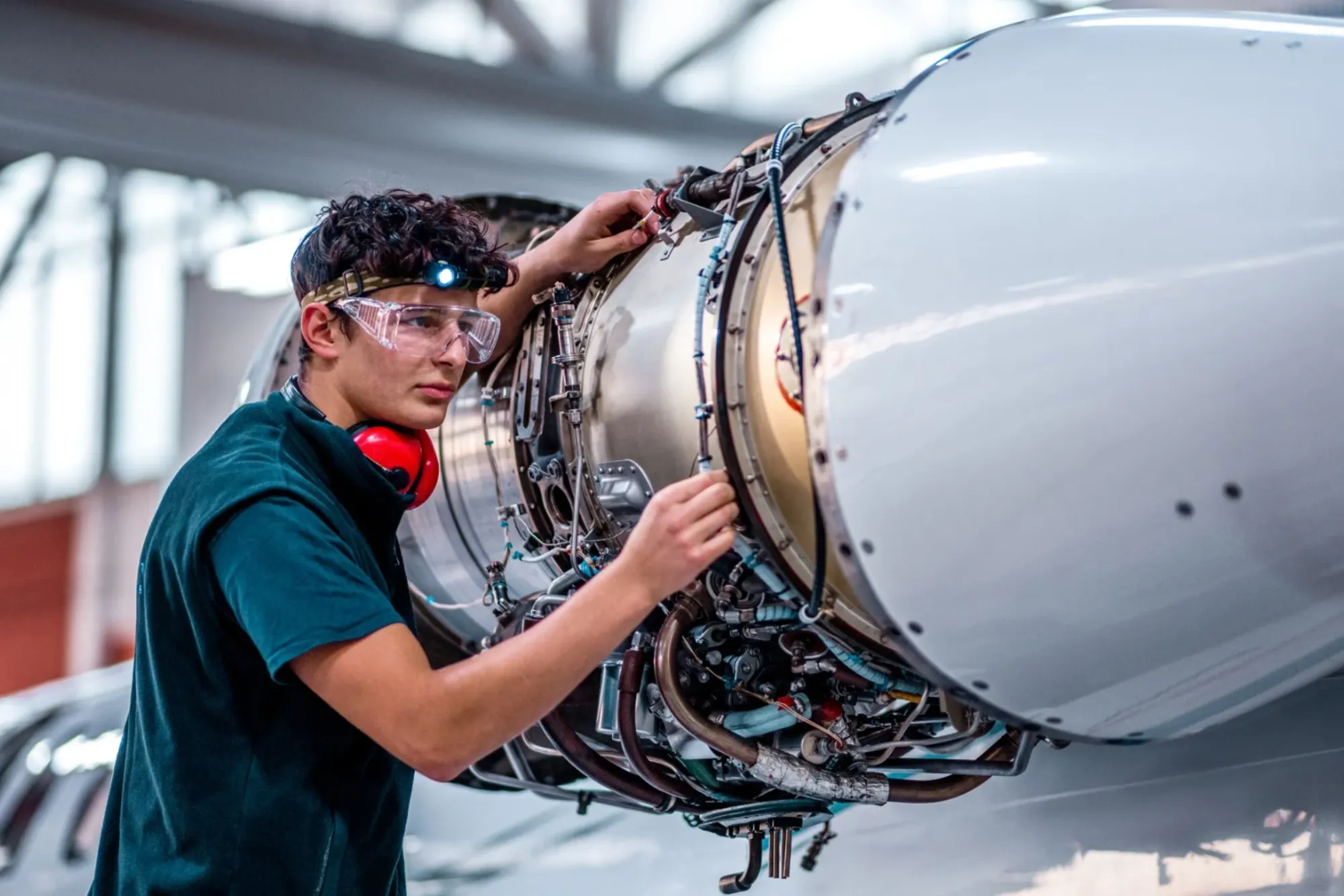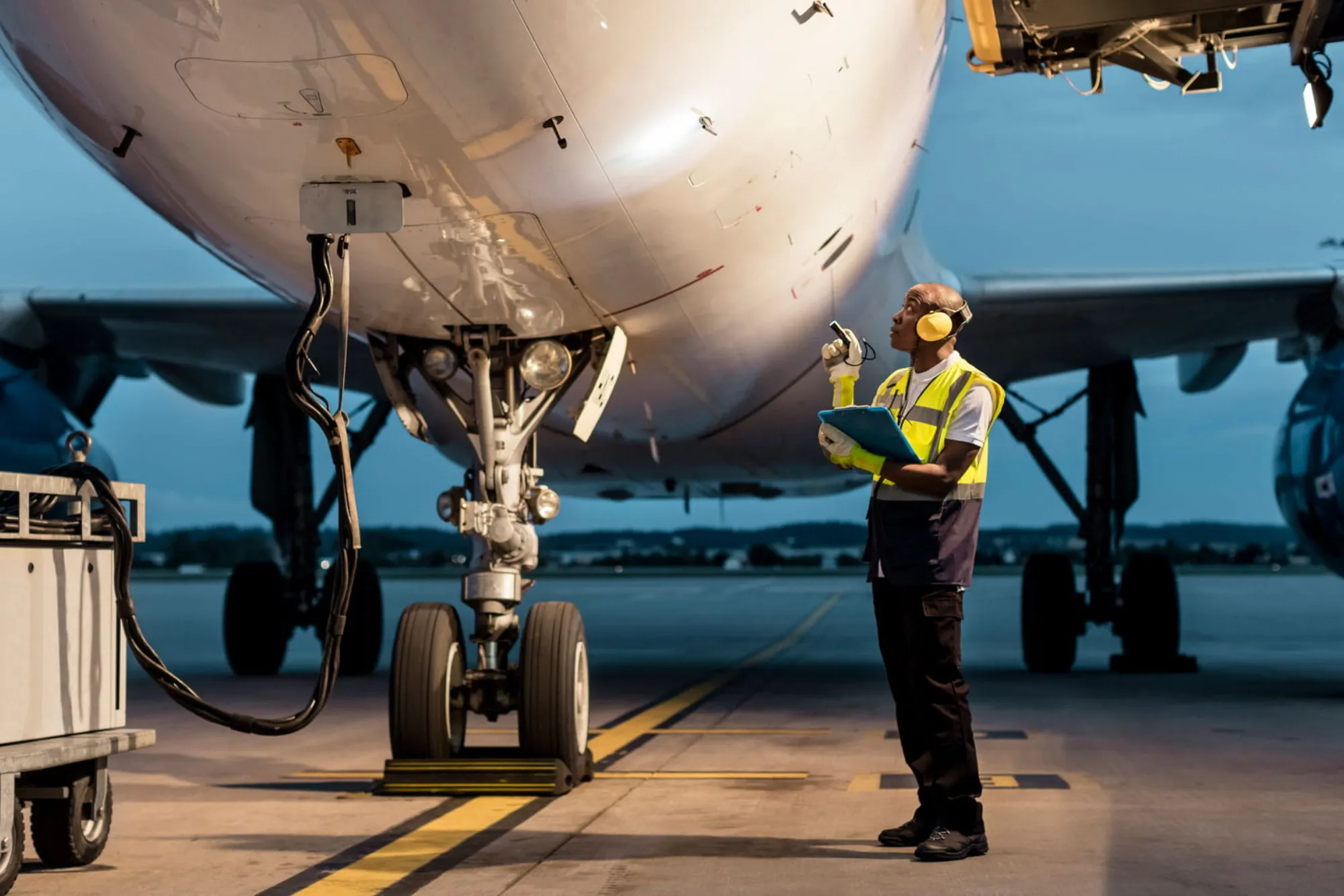Aviation maintenance is one of the most critical sectors within the aerospace industry. The safety, efficiency, and reliability of an aircraft are directly influenced by the skills and knowledge of Aviation Maintenance Technicians. These professionals are responsible for inspecting, repairing, and maintaining aircraft to ensure their airworthiness. In this article, we’ll explore the core responsibilities, career path, qualifications, and opportunities available for an aviation maintenance technician.
What is an Aviation Maintenance Technician?
An Aviation Maintenance Technician (AMT) is a highly trained professional responsible for keeping aircraft safe and ready for flight. These technicians work on various parts of the aircraft, including engines, hydraulic systems, landing gear, electrical components, and more. They perform routine maintenance checks, diagnose mechanical and electrical issues, and repair or replace parts as needed.
Key Responsibilities of an Aviation Maintenance Technician
The duties of an aviation maintenance technician are extensive and require strong attention to detail and technical proficiency. The core responsibilities include:
- Conducting regular aircraft inspections to ensure compliance with safety standards
- Troubleshooting mechanical, electrical, and hydraulic issues
- Performing routine maintenance tasks, such as replacing worn-out parts and conducting system tests
- Keeping detailed records of maintenance activities and repairs
- Coordinating with pilots and engineers to ensure the smooth operation of the aircraft
- Responding to emergency maintenance needs, including unscheduled repairs
These professionals work in various environments, such as airports, maintenance hangars, and repair facilities. Whether they’re performing pre-flight checks or deep-level overhauls, the role of an aviation maintenance technician is essential to keeping the aviation industry running smoothly.
Skills Required to Become an Aviation Maintenance Technician

Becoming a successful aviation maintenance technician requires a combination of technical expertise, problem-solving skills, and physical stamina. Here are some essential skills needed:
- Technical Knowledge: Technicians must have a deep understanding of aircraft systems, engines, and parts.
- Attention to Detail: Precision is crucial when working on aircraft to avoid even the smallest error that could lead to major issues.
- Problem-Solving Ability: Identifying and fixing complex problems under tight deadlines is often part of the job.
- Manual Dexterity: Handling tools and working in confined spaces is common, so good hand-eye coordination is essential.
- Physical Stamina: The job often requires long hours and sometimes working in physically challenging conditions, such as outdoors or in small spaces.
- Communication Skills: Collaborating with team members, pilots, and engineers is crucial for completing tasks efficiently and safely.
Education and Certifications Required for Aviation Maintenance Technicians
Educational Path
Most aviation maintenance technicians attend a specialized training program at an accredited institution, often referred to as an Aviation Maintenance Technician School (AMTS). These programs are approved by the Federal Aviation Administration (FAA) in the United States, and similar regulatory bodies in other countries.
Certification
To legally work as an aviation maintenance technician, certification is required. In the U.S., technicians must pass exams administered by the FAA to earn the Airframe and Powerplant (A&P) Certification. There are two main types of certifications:
- Airframe Certification: Focuses on the structure and frame of the aircraft.
- Powerplant Certification: Covers aircraft engines, including their operation and repair.
Technicians can obtain either or both certifications, depending on their area of specialization. Additional certifications, such as those for avionics or specific aircraft models, may also be required depending on the employer.
Ongoing Training
The aviation industry constantly evolves, with new technologies and regulations emerging regularly. As a result, certified aviation maintenance technicians must participate in continuing education to keep their skills and knowledge up to date.
Career Outlook and Salary Expectations
The demand for aviation maintenance technicians is growing due to the increasing number of aircraft in operation globally. As air travel continues to expand, so does the need for qualified technicians who can ensure aircraft safety and reliability.
Job Opportunities
Aviation maintenance technicians can work in various sectors, including:
- Commercial airlines
- Private aviation companies
- Aircraft manufacturing
- Government and military services
- Aircraft repair and maintenance facilities
Salary Expectations
The salary for aviation maintenance technicians can vary based on experience, location, and certification level. On average, the annual salary for an AMT in the U.S. is around $60,000, with opportunities for overtime pay. Technicians with advanced certifications or specialized skills can earn significantly more, with some making over $80,000 per year.
Job Growth
The Bureau of Labor Statistics (BLS) projects steady job growth for aviation maintenance technicians over the next decade, particularly as more airlines expand their fleets and the need for maintenance services increases. This makes it an attractive career choice for individuals seeking long-term stability and growth opportunities in the aerospace industry.
A Day in the Life of an Aviation Maintenance Technician

A typical day for an aviation maintenance technician may involve performing scheduled maintenance checks, responding to aircraft repair requests, and working closely with other aviation professionals. Depending on their job, technicians may be required to:
- Inspect aircraft systems using diagnostic tools and manuals
- Perform hands-on repairs in cramped or outdoor environments
- Communicate with pilots and engineers to address issues
- Ensure compliance with safety standards and regulations
The work environment can be fast-paced and sometimes stressful, especially when dealing with time-sensitive repairs. However, aviation maintenance technicians play a vital role in ensuring the safety of air travel, making it a rewarding and respected profession.
Tools and Technology Used
Technicians rely on a wide range of tools and technology to perform their duties effectively. This includes hand tools like wrenches and screwdrivers, as well as advanced diagnostic equipment and software systems. The integration of technology into aircraft maintenance has also led to the use of computerized maintenance tracking systems, which help technicians record and monitor repairs in real-time.
Table: Aviation Maintenance Technician at a Glance
| Aspect | Details |
|---|---|
| Job Title | Aviation Maintenance Technician (AMT) |
| Education Required | High school diploma + FAA-approved AMTS program |
| Certifications | Airframe and Powerplant (A&P) Certification |
| Work Environment | Airports, hangars, aircraft repair facilities |
| Skills Needed | Technical knowledge, attention to detail, problem-solving, communication, physical stamina |
| Salary | Average $60,000 annually; can exceed $80,000 with experience and certifications |
| Job Growth | Steady, with increasing demand as the aviation industry expands |
| Specializations | Avionics, powerplant, airframe, specialized aircraft models |
FAQs About Aviation Maintenance Technicians
What does an aviation maintenance technician do?
An aviation maintenance technician is responsible for inspecting, repairing, and maintaining aircraft systems to ensure they are safe for operation. This includes troubleshooting mechanical and electrical issues, performing routine maintenance tasks, and ensuring compliance with safety standards.
What certifications are needed to become an aviation maintenance technician?
To work as an aviation maintenance technician, you need to obtain the FAA’s Airframe and Powerplant (A&P) Certification. Additional certifications in avionics or specific aircraft types may be required depending on the job.
How much does an aviation maintenance technician earn?
The average salary for an aviation maintenance technician is around $60,000 per year. With additional certifications or specialized skills, salaries can exceed $80,000 annually.
Is there demand for aviation maintenance technicians?
Yes, there is a growing demand for aviation maintenance technicians as air travel increases and the global fleet of aircraft expands. Job prospects are expected to remain steady, with opportunities for advancement.
What skills are important for an aviation maintenance technician?
Essential skills include technical expertise, attention to detail, problem-solving abilities, manual dexterity, and good communication skills. Physical stamina is also important, as the job can require long hours and working in confined spaces.
Becoming an aviation maintenance technician is a rewarding career path for those who are passionate about aviation and enjoy working with their hands. With the right education and certifications, you can enter a field with strong job prospects, competitive salaries, and the chance to play a critical role in ensuring the safety of aircraft worldwide. Whether you’re just starting out or looking to specialize in a particular area of aviation, this career offers numerous opportunities for growth and advancement.
